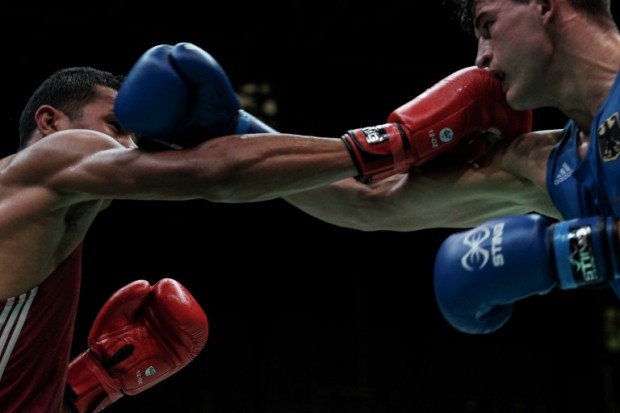
Venezuela’s Johan Jose Gonzalez Mendez (L) fights against Germany’s Xhek Paskali during the Men’s Middle (75kg) Boxing match as a test event for Rio 2016 Olympic games at Riocentro in Rio de Janeiro, Brazil, on December 6, 2015. AFP PHOTO / YASUYOSHI CHIBA / AFP / YASUYOSHI CHIBA
MANCHESTER, England — The world’s best professional boxers could be eligible to compete in this year’s Olympics under proposals put forward by the sport’s world governing body.
The International Boxing Association (AIBA) discussed a fast-track proposal to open Olympic tournaments to all boxers during its meetings in Manchester this week.
After the meeting Wednesday, AIBA President Ching-Kuo Wu said the proposal could be ratified within months, potentially in time for the Olympics in Rio de Janeiro in August.
“We want the best boxers to come to the Olympic Games,” Wu told Britain’s Press Association, adding that it was “absolutely possible” the changes could be made in time for the Rio Games.
But with the qualifying process already well under way for the Rio field, a large influx of star pro boxers seems unlikely this year.
Mike Martino, the executive director of USA Boxing, told The Associated Press that he doesn’t anticipate any star American fighters joining the Rio team.
“Do I think it’s going to happen this year? No,” Martino said. “Practically speaking, we’re looking at 2020. But it’s something that’s been on our radar screen, something we’ve talked about for the last four years, knowing that AIBA pro boxers were going to be in the Olympics. We’ve talked to the USOC about how it impacts the sport, and it’s huge. The Dream Team changed basketball in the Olympics forever. This will obviously change boxing forever.”
Martino said that while USA Boxing alumni such as Andre Ward and Floyd Mayweather Jr. have provided financial and personal support to the program, no star professional boxers have expressed serious interest in joining the U.S. men’s team, which hasn’t won a gold medal in the last two Olympics.
Martino added that he has heard from “second-tier pros that would consider it because maybe they didn’t achieve their goals, but realistically speaking, I think it’s going to be difficult” for star boxers to compete in the Olympics.
It’s also too late to claim many qualification spots: Martino noted that while Carlos Balderas is the only American already qualified for Rio due to his participation in AIBA’s World Series of Boxing, Russia already has eight boxers qualified in the 10 Olympic weight divisions, while Cuban fighters have already reserved seven spots.
AIBA said its idea was being proposed to national federations, and must then be ratified by AIBA’s executive commission. Each national federation would then have to address its own qualification rules to make the changes possible, a process that could be difficult to complete in time for Rio.
“It is an IOC policy to have the best athletes in the Games, and of the international federations, AIBA is probably the only one without professional athletes in the Olympics,” Wu said.
The proposed changes are only the latest step in AIBA’s multiyear quest to control every aspect of boxing, from the lowest amateur fights to the heights of the pro sport. Since Wu became AIBA president in 2006, AIBA has dropped the word “amateur” from its name and banned fighters from wearing headguards in AIBA-sanctioned men’s events, still a subject of heavy medical debate.
Wu’s efforts have had mixed success. After years of apparently heavy spending, AIBA’s World Series of Boxing and APB professional boxing program have gained little traction outside nations with no established structure of professional boxing.
Since 2013, Olympics eligibility has been extended to professional boxers who have fought fewer than 15 paid bouts and were willing to sign a short-term contract with APB.
AIBA thought the lure of an Olympic medal would attract pros, but the organization is still struggling to break the lucrative bonds between pro fighters and more established global promoters. The elimination of Olympic qualifying strictures appears to be the next step.
Wu said AIBA wants to mark the body’s 70th birthday with the groundbreaking change, and that the idea has “already received a very strong, positive response from our members.”
Wu said boxing needs to “think about what the future of the sport will be.”
“After 70 years, it is up to AIBA to set up a good foundation which will last for many decades,” he added. “When I took over the presidency in 2006 I made it very clear the term of amateur is not really relevant because when you look now at all the Olympic sports, who is really amateur?
“I think the process is very clear and we plan to consider it very thoroughly.”